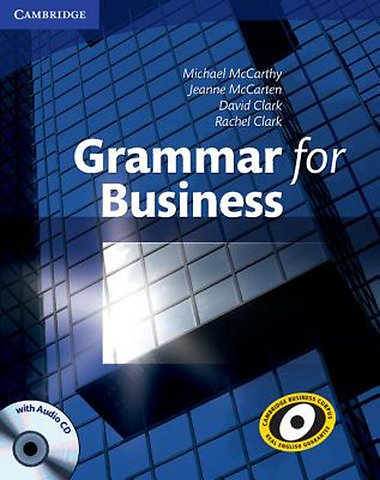Grammar for Business with Audio CD
Paperback Engels 2009 1e druk 9780521727204Samenvatting
Deze uitgave is een referentiegids met de essentiële grammatica en oefeningen voor iedereen die de Engelse taal binnen een zakelijke context gebruikt. 'Grammar for Business' is een must-have voor business studenten en voor iedereen waar Engels op de werkplek de voertaal is.
Trefwoorden
engelse grammatica zakelijk engels taalbeheersing taal communicatie werkwoordstijden business english schrijfvaardigheid present continuous present simple grammaticale oefeningen zakelijke communicatie modaal werkwoord internationale zaken passive voice conditional sentences audio cd write for business business talk phrasal verbs question tags reported speech formeel en informeel engels vergelijkingen voorzetsels
Trefwoorden
Specificaties
Lezersrecensies
Inhoudsopgave
U kunt van deze inhoudsopgave een PDF downloaden
2. Present continuous Business talk: Present continuous + always
3. Present simple and continuous Business talk: State verbs
4. Present perfect simple and continuous
Speaking strategies 1 Discussing
Test 1: Units 1-4
5. Past simple and continuous Business talk: Using past tenses to be polite
6. Present perfect and the past Business talk: Using continuous forms to give background information
7. Past perfect simple and continuous Business talk: Regrets and intentions
8. Used to and would Business talk: be/get used to
Speaking strategies 2 Managing conversations
Test 2: Units 5-8
9. The future 1 (be going to, present continuous)
10. The future 2 (will, shall, the present tense)
11. Future continuous and future perfect Business talk: Using the future continuous to be polite
12. Other ways of talking about the future
Speaking strategies 3 Emphasising and softening
Test 3: Units 9-12
13. Modals 1 (talking about possibility and ability, asking, off ering and giving permission)
14. Modals 2 (making suggestions and giving advice)
15. Modals 3 (saying what people have to do)
16. Modals 4 (speculating and saying how certain you are)
Speaking strategies 4 Simple spoken grammar
Test 4: Units 13-16
17. Conditionals 1 (talking about the present and future)
18. Conditionals 2 (talking about the hypothetical present and past)
19. The passive 1 (forming and using the passive)
20. The passive 2 (modal verbs, two-object verbs, have and get)
Speaking strategies 5 Making your meaning clear and avoiding misunderstandings
Test 5: Units 17-20
21. Questions Business talk: Persuading and giving opinions with negative questions
22. Question tags Business talk: Question tags for checking information
23. Reported speech 1 (statements and instructions)
24. Reported speech 2 (questions) Write for business: Making polite requests in business letters
Speaking strategies 6 Checking information
Test 6: Units 21-24
25. Verbs and objects Business talk: Typical business uses of verbs and objects
26. -ing and infinitives after verbs Write for business: Giving reasons and views
27. Phrasal verbs Business talk: Phrasal verbs with get
28. Prepositions Business talk: Describing change
Speaking strategies 7 Organising what you say and highlighting information
Test 7: Units 25-28
29. Adjectives Write for business: Describing your products and services
30. Adverbs Business talk: Giving your personal perspective
31. Comparisons 1 (comparatives, as - as) Business talk: Modifying comparisons
32. Comparisons 2 (superlatives, comparing with verbs)
Speaking strategies 8 Being an active listener
Test 8: Units 29-32
33. Countability and number Write for business: Checking verbs after singular and plural nouns
34. Articles Write for business: Not using the
35. Quantifiers Write for business: Levels of formality
36. Possessives and reflexive pronouns Write for business: Possessive noun phrases with of
Speaking strategies 9 Vague language 1
Test 9: Units 33-36
37. Relative clauses 1 (who, whose, which, that)
38. Relative clauses 2 (whom, where, when, -ing, -ed)
39. Conjunctions and linking words 1 Write for business: Linking ideas in formal reports
40. Conjunctions and linking words 2 Business talk: Reasons, results and consequences
Speaking strategies 10 Vague language 2
Test 10: Units 37-40
Key
Recording script
Appendix 1: Spelling
Appendix 2: Common prefixes and suffixes
Appendix 3: North American English
Appendix 4: Formal and informal English
Appendix 5: Irregular verbs
Appendix 6: Verb patterns
Appendix 7: Prepositions
Appendix 8: Saying numbers, weights and measures
CD tracklist
Anderen die dit boek kochten, kochten ook
Rubrieken
- advisering
- algemeen management
- coaching en trainen
- communicatie en media
- economie
- financieel management
- inkoop en logistiek
- internet en social media
- it-management / ict
- juridisch
- leiderschap
- marketing
- mens en maatschappij
- non-profit
- ondernemen
- organisatiekunde
- personal finance
- personeelsmanagement
- persoonlijke effectiviteit
- projectmanagement
- psychologie
- reclame en verkoop
- strategisch management
- verandermanagement
- werk en loopbaan









